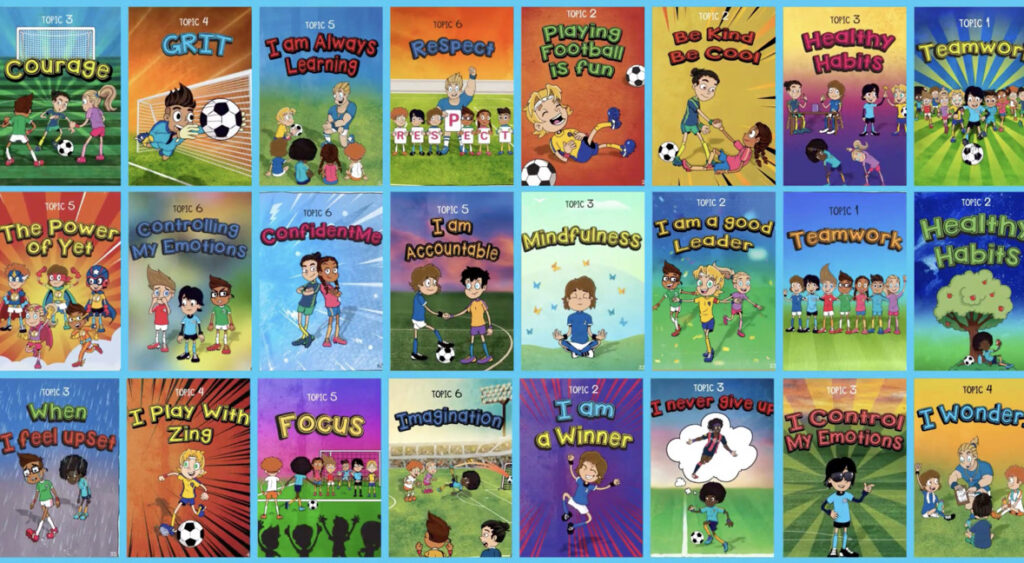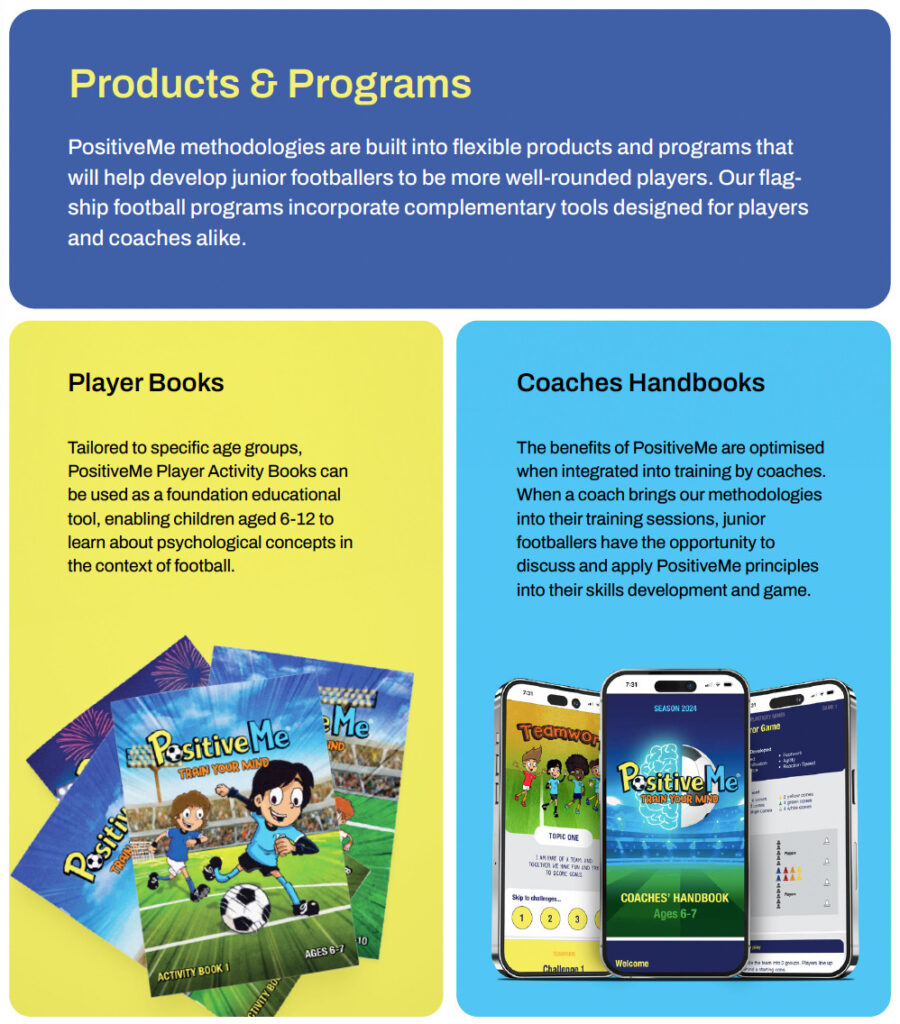Penalty shootouts have delivered some of the most memorable moments in football history.
They have turned legends into immortals but have also created moments of pure heartbreak.
A-Leagues legend Marcelo Carrusca is all too familiar with the feeling of heartbreak in a shoot-out.
In 2006, the Argentinean missed a penalty which saw his boyhood club Estudiantes bow out of the quarter-final of the Copa Libertadores – the biggest club competition in South America.
The mental toll of the miss followed him for years, and ultimately, the subsequent fallout led to him losing his love for the game.
However, it was this moment that nearly two decades later provided the inspiration for PositiveMe, a program aimed to help support the psychological development of young footballers – on and off the field – through his new program.
PositiveMe‘s mission is to help kids build confidence, emotional control, and resilience — so they stay in sport longer, enjoy the journey more, and grow into stronger people, by working directly with clubs, schools and coaches, integrating the psychological component to traditional football training.
Kids in the program are given fun workbooks to learn valuable life skills including mindset, leadership and wellbeing, while coaches can track progress via a web app.
In the latest edition of the PFA’s Footballers in Spotlight series, Carrusca chats with pfa.net.au about the creation of his program.
Q: Marcelo, tell us a little bit about PositiveMe?
Carrusca: “I started it three years ago with two partners. One is a psychologist, one is a teacher, and we tried to create a program that can help kids in the psychological and social aspects of the game.
“We developed some books for kids and a web app for coaches, where they can learn how to implement and improve in the psychological aspect.
“In every club and in every coaching course that we do around the world, we talk about four components, which are technical, tactical, physical and psychological.
“We created PositiveMe, so we can help kids develop a positive mindset [to complement players’ psychological development], understand how to deal with setbacks, how to control their emotions, and how to help them develop life skills at the same time.
“We use football as a vehicle to educate the whole community, especially kids. But also, we develop this for coaches that can be can optimise the learning every week at club level.”

Q: How long did it take for it to turn from an idea into a tangible program?
Carrusca: “It was a very long process. I think it took us two and a half years to put it all together.
“It’s been very challenging. When I was a professional player, especially a young player, I was a timid player. I didn’t believe in myself. I didn’t grow up with a positive mindset, and a lot of things that happened in my career were because I didn’t have that strong mindset from a young age.
“One of the key moments of my career was when I played for Estudiantes de La Plata. We played in the Copa Libertadores, the biggest competition in South America. We played in the quarter finals against Sao Paolo in Brazil, in front of 80,000 people. I was 21 years old, and I took the last penalty in a penalty shootout.
“(Diego) Simeone was the coach back then. If I scored, we kept going [in the shootout]. If I miss it, we are out of the cup. So unfortunately, I couldn’t handle the pressure. I couldn’t focus. I was very, very nervous, and I missed the penalty. From that day, my life changed.
“I didn’t want to take another penalty for seven or eight years; I had to leave the club to move to another country. That’s why I went to Galatasaray. One of the reasons why I decided to move was that I didn’t have the tools to deal with the situation, and I didn’t have the tools to deal with the problem I had after that, either.
“I started psychology a couple of years after that, because I wasn’t happy, I didn’t enjoy the game. I almost quit football the year before I came to Australia. I was a bit depressed, to be honest.
“You know how it is in Argentina. If you compare it with Australia, it’s very different. So over there living in my city, every single fan reminded me of what I had done on social media, in the street, at the club, everywhere. So, I decided to leave and go to another country, and everything that happened that day changed my life.
“I decided to do this program to help kids. They might not become professionals, but they will have the tools, the psychological tools, to deal with those type of situations or setbacks and have resilience when things happen in their life.”
Q: The mental side of the game. It’s something that wasn’t spoken about as much when you came through the system. How important is that now?
Carrusca: “It’s number one, because you can be the most skillful player in the world, but if you’re not mentally fit, if you’re not enjoying the game, if you don’t know how to deal with setbacks, injuries, bad days, coaches, pressure from parents, if you don’t have that positive mindset, you cannot achieve anything. You cannot play and excel on the field or even off the field.
“So, in my opinion, we talk about the four components of the game, everything coming from our mind. Everything is now how you think and if you don’t have clear thoughts about situations of the game or of the game, and you’re not mentally healthy, it’s going to be almost impossible to act and perform.
“When I was young, I experienced that a lot, and then as a father, as a coach and as an ex-professional, I believe training the mind of the players, is the main thing in football.”

Q: Talk to us about the six pillars of the program and how they help the kids?
Carrusca: “We believe that happy players perform better. If the kids are enjoying the game, they’re going to perform their best.
“Our program helps the kids to enjoy the game more and be happier on and off the field and we talk about positive psychology.
“We see scientific proof that psychological training is important and helps a lot of individuals and then we talk about life skills as well.
“I believe as clubs and organisations, we can have this positive movement around a positive mindset, to [encourage kids to] be able to enjoy the game more.
“We then talk about neuroplasticity as well, because we know you can train your brain as well. So we create some exercises and cool activities for the kids to train their brains as well.
“We talk about education, not just for the kids, but also for the coaches, which at the end of the day are the parents, coaches in junior level, MiniRoos especially, and how we can help through the program to help the parents to have better communication skills, how to provide feedback, how its filtered to the players, how to speak in a positive way and how to run visualisation, for example.”
Q: How has this program helped you with the adjustment into life after football. When players retire, they’re not always sure what they want to do, but it seems like this has been something that’s helped you stay involved?
Carrusca: “It’s helped me a lot, and it’s another reason why I started this. I did a presentation the other day about mental health and I wish I had this training when I was younger because I know my career would have gone much, much further, and I made a lot of decisions because I didn’t have this psychological foundation I learned until when I was 25-26 going to a psychologist.
“But when I was 35 years old, for example, I was at Western Sydney Wanderers. I had one of my best seasons, but that was my last contract in the A-League. So, to deal with that and understand that now, I need to start thinking about life after football and I’m lucky I have that knowledge and that positive mindset to say: ‘you know what? This is a setback. I want to take on this challenge. I will try to focus on what is next, which is sharing all my knowledge to all the kids around.’
Q: How important is the enjoyment factor when you’re playing football?
Carrusca: “A lot of clubs and academies are implementing [high performance] video analysis, VEOs, cameras, GPS, and they put so much pressure on kids.
“Those kids, from the age of nine to 12, should be just playing the game and enjoying the game every single week. They shouldn’t be worried about if they didn’t make that run or score that goal.
“So my aim is how can we give kids tools for them to enjoy the game now and enjoy life as well now and when they finish playing. I think we need to focus more on the wellbeing of the players and create a more positive environment.”
To find out more information, click here or email: marcelo@positiveme.com.au.







